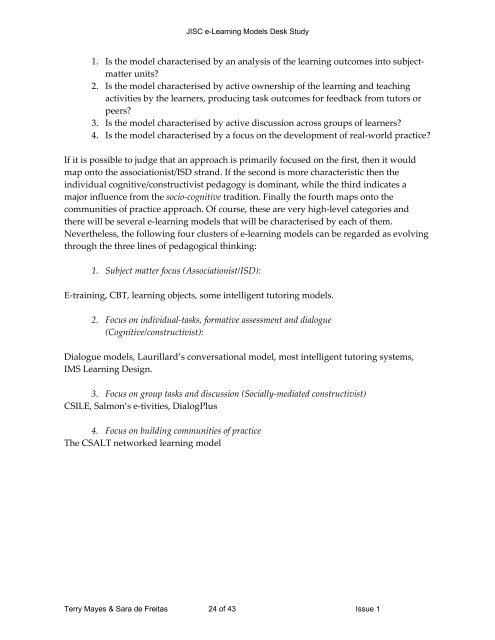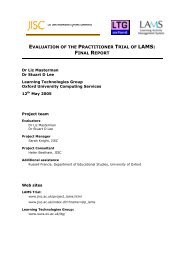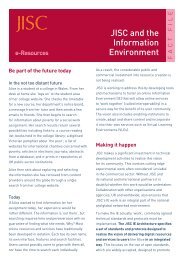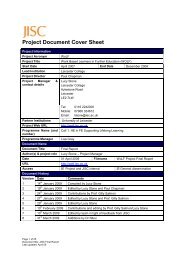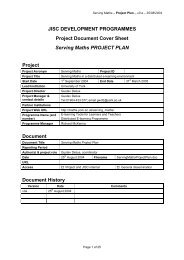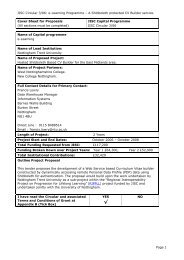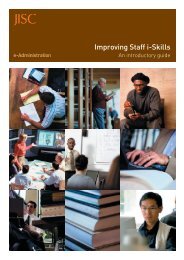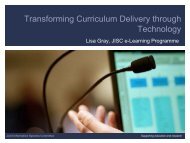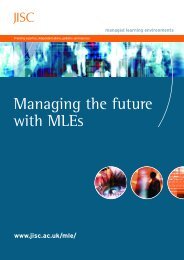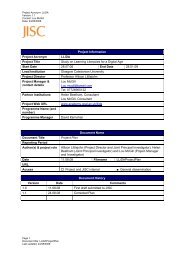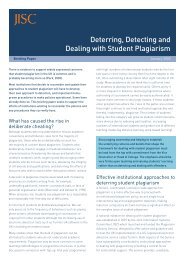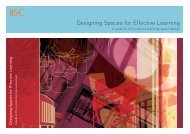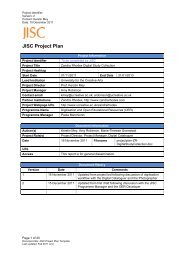Review of e-learning theories, frameworks and models - Jisc
Review of e-learning theories, frameworks and models - Jisc
Review of e-learning theories, frameworks and models - Jisc
You also want an ePaper? Increase the reach of your titles
YUMPU automatically turns print PDFs into web optimized ePapers that Google loves.
JISC e-Learning Models Desk Study<br />
1. Is the model characterised by an analysis <strong>of</strong> the <strong>learning</strong> outcomes into subjectmatter<br />
units?<br />
2. Is the model characterised by active ownership <strong>of</strong> the <strong>learning</strong> <strong>and</strong> teaching<br />
activities by the learners, producing task outcomes for feedback from tutors or<br />
peers?<br />
3. Is the model characterised by active discussion across groups <strong>of</strong> learners?<br />
4. Is the model characterised by a focus on the development <strong>of</strong> real-world practice?<br />
If it is possible to judge that an approach is primarily focused on the first, then it would<br />
map onto the associationist/ISD str<strong>and</strong>. If the second is more characteristic then the<br />
individual cognitive/constructivist pedagogy is dominant, while the third indicates a<br />
major influence from the socio-cognitive tradition. Finally the fourth maps onto the<br />
communities <strong>of</strong> practice approach. Of course, these are very high-level categories <strong>and</strong><br />
there will be several e-<strong>learning</strong> <strong>models</strong> that will be characterised by each <strong>of</strong> them.<br />
Nevertheless, the following four clusters <strong>of</strong> e-<strong>learning</strong> <strong>models</strong> can be regarded as evolving<br />
through the three lines <strong>of</strong> pedagogical thinking:<br />
1. Subject matter focus (Associationist/ISD):<br />
E-training, CBT, <strong>learning</strong> objects, some intelligent tutoring <strong>models</strong>.<br />
2. Focus on individual-tasks, formative assessment <strong>and</strong> dialogue<br />
(Cognitive/constructivist):<br />
Dialogue <strong>models</strong>, Laurillard’s conversational model, most intelligent tutoring systems,<br />
IMS Learning Design.<br />
3. Focus on group tasks <strong>and</strong> discussion (Socially-mediated constructivist)<br />
CSILE, Salmon’s e-tivities, DialogPlus<br />
4. Focus on building communities <strong>of</strong> practice<br />
The CSALT networked <strong>learning</strong> model<br />
Terry Mayes & Sara de Freitas 24 <strong>of</strong> 43 Issue 1


